Nunix
On this page, you find all documents, package deals, and flashcards offered by seller NUNIX.
- 587
- 0
- 0
Community
- Followers
- Following
587 items

Portage Learning: A&P 1 Lab 4
QUIZ: spirometry ANS: a measurement of breathing (or lung volumes) QUIZ: pulmonary fibrosis ANS: the formation of scar tissue in the lung, resulting in decreased lung capacity and increased difficulty in breathing QUIZ: Emphysema ANS: a condition in which the air sacs of the lungs are damaged and enlarged, causing breathlessness. QUIZ: Tidal Volume (TV) ANS: Amount of air that moves in and out of the lungs during a normal breath QUIZ: Inspiratory Reserve Volume (IRV) ANS...
- Exam (elaborations)
- • 2 pages •
QUIZ: spirometry ANS: a measurement of breathing (or lung volumes) QUIZ: pulmonary fibrosis ANS: the formation of scar tissue in the lung, resulting in decreased lung capacity and increased difficulty in breathing QUIZ: Emphysema ANS: a condition in which the air sacs of the lungs are damaged and enlarged, causing breathlessness. QUIZ: Tidal Volume (TV) ANS: Amount of air that moves in and out of the lungs during a normal breath QUIZ: Inspiratory Reserve Volume (IRV) ANS...
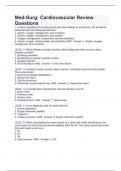
Med-Surg: Cardiovascular Review Questions
QUIZ: 4. A complication of peripheral vascular disease may be: 1. stasis ulcer. 2. Pressure ulcer. 3. Gastric ulcer. 4. Duodenal ulcer. ANS: Answer: 1. stasis ulcer. QUIZ: 5. A key diagnostic test for heart failure is: 1. serum potassium. 2. B-type natriuretic peptide. 3. Troponin I 4. cardiac enzymes. ANS: Answer: 2. B-type natriuretic peptide. QUIZ: 6. While auscultating the heart sounds of a client with mitral insufficiency, the nurse hears an extra heart sound immediatel...
- Exam (elaborations)
- • 195 pages •
QUIZ: 4. A complication of peripheral vascular disease may be: 1. stasis ulcer. 2. Pressure ulcer. 3. Gastric ulcer. 4. Duodenal ulcer. ANS: Answer: 1. stasis ulcer. QUIZ: 5. A key diagnostic test for heart failure is: 1. serum potassium. 2. B-type natriuretic peptide. 3. Troponin I 4. cardiac enzymes. ANS: Answer: 2. B-type natriuretic peptide. QUIZ: 6. While auscultating the heart sounds of a client with mitral insufficiency, the nurse hears an extra heart sound immediatel...
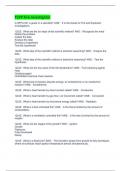
TCFP Fire Investigator
QUIZ: What are the four parts of the fire tetrahedron? ANS: Fuel (reducing agent) Heat Oxidizing agent Uninhibited chemical chain reaction QUIZ: What kind of reaction absorbs energy, an endothermic or an exothermic reaction? ANS: Endothermic QUIZ: What is heat transfer by direct contact called? ANS: Conduction QUIZ: What is heat transfer by gas flow / air movement called? ANS: Convection QUIZ: What is heat transfer by microwave energy called? ANS: Radiation ...
- Exam (elaborations)
- • 53 pages •
QUIZ: What are the four parts of the fire tetrahedron? ANS: Fuel (reducing agent) Heat Oxidizing agent Uninhibited chemical chain reaction QUIZ: What kind of reaction absorbs energy, an endothermic or an exothermic reaction? ANS: Endothermic QUIZ: What is heat transfer by direct contact called? ANS: Conduction QUIZ: What is heat transfer by gas flow / air movement called? ANS: Convection QUIZ: What is heat transfer by microwave energy called? ANS: Radiation ...
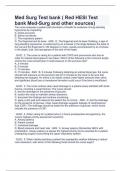
Med Surg Test bank ( Red HESI Test bank Med-Surg and other sources)
QUIZ: 4. When caring for a patient who is 3 hours postoperative laryngectomy, the nurse's highest priority assessment would be: A. Airway patency B. Patient comfort C. Incisional drainage D. Blood pressure and heart rate ANS: A. Airway patency Remember ABCs with prioritization. Airway patency is always the highest priority and is essential for a patient undergoing surgery surrounding the upper respiratory system. QUIZ: 5. When initially teaching a patient the supraglottic swal...
- Exam (elaborations)
- • 76 pages •
QUIZ: 4. When caring for a patient who is 3 hours postoperative laryngectomy, the nurse's highest priority assessment would be: A. Airway patency B. Patient comfort C. Incisional drainage D. Blood pressure and heart rate ANS: A. Airway patency Remember ABCs with prioritization. Airway patency is always the highest priority and is essential for a patient undergoing surgery surrounding the upper respiratory system. QUIZ: 5. When initially teaching a patient the supraglottic swal...
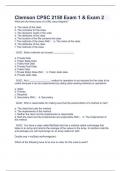
Clemson CPSC 2150 Exam 1 & Exam 2
QUIZ: Who is responsible for making sure that the postcondition of a method is met? a. The client that calls the method b. The implementer of the method c. Neither the client not the implementer is responsible d. Both the client and the implementer are responsible ANS ; b. The implementer of the method QUIZ: You have a class called MyStats that has a method called myAverage that takes in an array and returns the average of the values in the array, In another code file and pack...
- Exam (elaborations)
- • 17 pages •
QUIZ: Who is responsible for making sure that the postcondition of a method is met? a. The client that calls the method b. The implementer of the method c. Neither the client not the implementer is responsible d. Both the client and the implementer are responsible ANS ; b. The implementer of the method QUIZ: You have a class called MyStats that has a method called myAverage that takes in an array and returns the average of the values in the array, In another code file and pack...
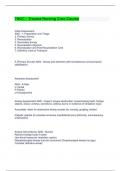
TNCC - Trauma Nursing Core Course
Airway Assessment ANS: Inspect: tongue obstruction, loose/missing teeth, foreign objects, blood, vomitus, secretions, edema, burns or evidence of inhalation injury Auscultate: listen for obstructive airway sounds (ie. snoring, gurgling, stridor) Palpate: palpate for possible occlusive maxillofacial bony deformity, subcutaneous emphysema Airway Interventions: ANS: Suction Remove foreign body if noted Jaw thrust maneuver (maintain cspine) Nasopharyngeal airway (can be conscious...
- Exam (elaborations)
- • 8 pages •
Airway Assessment ANS: Inspect: tongue obstruction, loose/missing teeth, foreign objects, blood, vomitus, secretions, edema, burns or evidence of inhalation injury Auscultate: listen for obstructive airway sounds (ie. snoring, gurgling, stridor) Palpate: palpate for possible occlusive maxillofacial bony deformity, subcutaneous emphysema Airway Interventions: ANS: Suction Remove foreign body if noted Jaw thrust maneuver (maintain cspine) Nasopharyngeal airway (can be conscious...
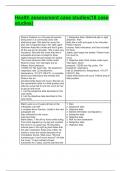
Health assessment case studies(18 case studies)
with a chief complaint of severe abdominal and flank pain on the right side. Interview Data He tells the nurse, "The pain came on rather suddenly about an hour ago. I was doing some work at my desk, and it started suddenly." He points to the right flank area as thelocation of the pain, but it extends into the right lower abdominal area as well. The parent describes the pain as "severe, sharp" pain. On a scale of O to 10, he states,This is off your pain scale- at Icast a 12.? He desc...
- Exam (elaborations)
- • 12 pages •
with a chief complaint of severe abdominal and flank pain on the right side. Interview Data He tells the nurse, "The pain came on rather suddenly about an hour ago. I was doing some work at my desk, and it started suddenly." He points to the right flank area as thelocation of the pain, but it extends into the right lower abdominal area as well. The parent describes the pain as "severe, sharp" pain. On a scale of O to 10, he states,This is off your pain scale- at Icast a 12.? He desc...
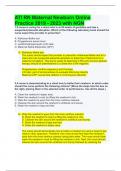
ATI RN Maternal Newborn Online Practice 2019 - 2023 with NGN
ATI RN Maternal Newborn Online Practice with NGN
- Exam (elaborations)
- • 45 pages •
ATI RN Maternal Newborn Online Practice with NGN
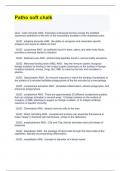
Patho soft chalk
Patho soft chalk
- Exam (elaborations)
- • 5 pages •
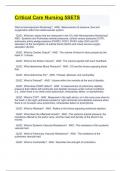
Critical Care Nursing 5SETS
QUIZ: What determines SV? ANS: Preload, afterload, and contractility. QUIZ: What is Preload? ANS: Volume within the ventricle at the end of diastole. QUIZ: What does PAWP reflect? ANS: A measurement of pulmonary capillary pressure that reflects left ventricular end diastolic pressure under normal conditions (i.e., when there is no mitral valve dysfunction, intracardiac defect, or dysrhythmia). QUIZ: What is CVP? ANS: Measured in the right atrium, or in the vena cav...
- Exam (elaborations)
- • 67 pages •
QUIZ: What determines SV? ANS: Preload, afterload, and contractility. QUIZ: What is Preload? ANS: Volume within the ventricle at the end of diastole. QUIZ: What does PAWP reflect? ANS: A measurement of pulmonary capillary pressure that reflects left ventricular end diastolic pressure under normal conditions (i.e., when there is no mitral valve dysfunction, intracardiac defect, or dysrhythmia). QUIZ: What is CVP? ANS: Measured in the right atrium, or in the vena cav...
